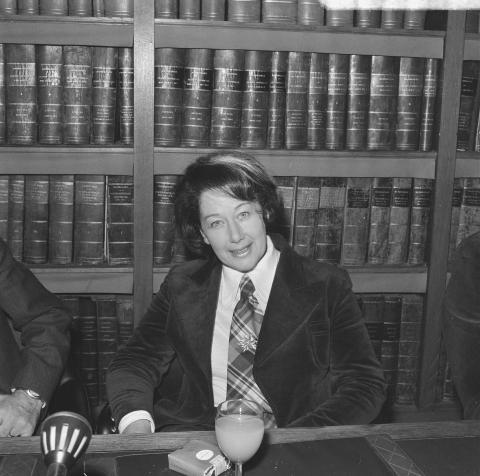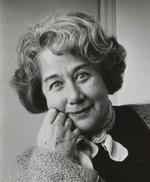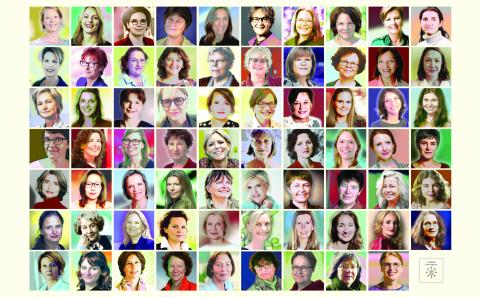Madzy Rood-De Boer, the first female professor in Tilburg
The late Madzy Rood-De Boer (1923-2009), a lawyer, was the first female professor in Tilburg: in 1971, she was appointed at the Law School of what was then called the Tilburg Catholic Academy (Katholieke Hogeschool Tilburg). She started as Lector by special appointment in Juvenile Law and Child Protection and later as professor by special appointment.
The appointment came as a bit of a surprise to her, because she was living in Amsterdam, raising two children, and she was not a Roman Catholic, which at that time did not exactly count as a recommendation in Tilburg. One of the founding fathers of the Law School in Tilburg, the late Herman Schoordijk (1927-2018), Professor of Private Law, Commercial Law, and Private International Law, talked her round to accepting the position, for two days a week.
Rood-De Boer had started law school in Leiden in 1943, but her studies were interrupted when the Dutch universities were closed at the order of the German occupying forces. She resumed her studies after the war and in 1962 obtained a doctorate in her hometown of Amsterdam, having successfully defended her PhD thesis entitled 'Ouders en kinderen. Aspecten van het familierecht' (Parents and Children. Aspects of Family Law). A year after her appointment in Tilburg, she also became Professor by special appointment in Juvenile Law and Child Protection at Utrecht University. She wrote about themes as family law and child protection and advocated the right of abortion and voluntary euthanasia.

Partly because of her background in child protection she was fully tuned in to what juvenile protection law was all about
Photo: Rood-De Boer at the presentation of the Den Uyl shadow cabinet in 1972
A socially engaged authority
In the 18 years that Madzy Rood-De Boer worked at Tilburg University, she helped lay the foundations of the two courses of Juvenile Law and Law of Persons & Family Law that have been taught at Tilburg ever since 1984. One of those who taught these courses is Professor Emeritus Paul Vlaardingerbroek. On her passing, he typified her as the pre-eminent authority on juvenile law and the child protection sector: “Partly because of her background in child protection (during World War II she worked as a care worker/group leader in youth care) she was fully tuned in to what juvenile protection law was all about. It shows from her many publications, her committee work, and all her other national and international activities.” Rood-De Boer was a leading expert in her area and served on several national committees whose remit included family and juvenile law.
The importance of this legislation regarding birth, life, and death extends to all citizens

In an interview she gave on the occasion of the university’s 75th anniversary, Rood-De Boer observed that this specialty is not the road to fortune for those who practice it, “but the importance of this legislation regarding birth, life, and death extends to all citizens.” She showed remarkable foresight when she said this, because issues like visitation rights, family reunification, and euthanasia have since remained high on the agenda.
Emancipation
Rood-De Boer was appointed at a time when the Zeitgeist breathed emancipation, deconfessionalization, and political engagement. She chaired the Dutch Women’s Council, served on the board of the Dutch Labor Party (PvdA), and she was a member of its feminist organization Rooie Vrouwen (Red Women), to name but a few of her activities. In 1972 she was a member of a left-wing shadow cabinet, but she declined a ministerial post when the PvdA formed a coalition government with the Christian Democratic Alliance (CDA), unlike her husband, Max Rood, who later joined the third Van Agt Cabinet as Minister for Home Affairs on behalf of the Liberal Democrats (D66).
While Rood-De Boer was the first female professor, she was not the first female scholar employed by Tilburg University. As early as 1927, the late Jacoba Hol (1886-1964) had been appointed Lector in Physical Geography. This academic position, abolished in the Netherlands in 1980, was that of a lecturer, with the official rank and salary scale just below that of Professor.
Until she was appointed professor in Utrecht in 1945, Jacoba Hol traveled to Tilburg on Saturdays to teach classes. Her audience initially consisted of students from both the Catholic Business School (Roomsch Katholieke Handelshoogeschool) and the Catholic College (Katholieke Leergangen), both of which used the same premises at the Bosscheweg; from 1929 onwards, she taught exclusively in the teacher training program.
Female professors
In 2021, the Executive Board of Tilburg University commissioned a collage of portraits of all female professors at Tilburg University. Since Rood-De Boer’s appointment, the number of women in academic positions has risen, but that increase comes with a notable inverse trend: the higher the position, the lower the percentage of women that attain it. In 2019, women made up 53% of PhD students, 45% of Assistant Professors, 29% of Associate Professors, and 23% of Professors (the target being 25%).
Education can empower groups of people to whom opportunity and growth are not obviously open
The aim of appointing more women to senior positions is also consistent with the commitment to emancipation, which has characterized Tilburg University from the beginning. The nature of the groups to be emancipated has changed over the years, but the central idea has remained the same: that higher education contributes to empowering groups of people to whom opportunity and growth are not obviously open. The university was founded in 1927, as a result of the process of Catholic emancipation, which followed centuries of discrimination by the Protestant government. Consequently, it was mostly students from the southern provinces who attended this university. A second wave of emancipation emerged as the university became increasingly accessible to students (both men and women) from non-academic backgrounds. The last wave in this context involved women in academic top-level positions, as well as students and academic staff who are natives from countries other than the Netherlands.

Photo: Since Rood-De Boer (second row from the bottom, second from the left), 69 women had been appointed at this university as full or endowed professors by 2021. Almost everyone provided a portrait for the collage, which pictures were subsequently processed by visual artist Marianne van Hest. By giving the photos a supporting color and by matching the sizes, a harmonious whole was created, which expresses the great importance that the university attaches to female scholars. The panel is hanging in Cobbenhagen building, near the Auditorium.
More information
Were you there? Let us know how you experienced it. Contact the editors.
Date of publication: 13 September 2022
